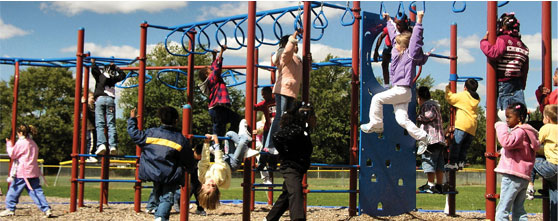
There’s an alarming trend sweeping the nation today. That trend is towards the removal of recess in elementary schools nationwide. This is disturbing news for many reasons, not the least of which is the obesity factor: According to the American Heart Association, one in three American children between the ages of two and nineteen are overweight or obese. Moreover, 15% of children are already obese at preschool age. While all obesity issues can’t be blamed on a lack of recess, there are definitely drawbacks associated with having recess taken out of the school day.
Recess in this context should not be confused with physical education. In general, physical education is a structured class led by a teacher. It typically occurs once a week. Recess, on the other hand, is a time of unstructured play that usually occurs once or twice daily, and typically takes place outdoors on a playground.
Recess has long been known to have positive effects on schoolchildren. Numerous studies conducted throughout the years indicate that recess not only provides a way for children to get exercise throughout the school day; it also provides benefits within the classroom learning environment. Recess allows children a break during the day’s activities, which enables them to focus better. It gives them an opportunity to release excess energy, thereby improving students’ focus and concentration, and decreasing interruptions during class. It also allows children to work on their social skills. Since most recess time is unstructured and sometimes unmonitored, children are left to interact with each other on their own, thereby practicing critical personal interaction skills.
In addition to the benefits mentioned above, further research shows that recess helps with the following:
Recess also allows children the opportunity to explore their bodies’ capabilities. They get a chance to run, catch, climb, swing, hang, spin, and kick. This builds their self-confidence, and the extra movement sends healthy blood to their brain cells. A study conducted by J.M. Healy found that increased blood flow to the brain increases the connections between neurons; the more connections, the better students are able to process all types of information, leading to better retention and higher achievement in the classroom.
So with all these benefits, why is recess being taken away? One theory is that it’s the unintentional result of the “No Child Left Behind Act” of 2001, which states that schools should develop assessments for, and measure results in, basic academic skills in order to receive federal funding. Some schools have used a focus on academia as their reasoning behind decreasing or eliminating recess. Rather than playing outside, their students are focusing on math and reading skills. However well-intentioned, their efforts may be having the opposite effect.
It’s up to teachers in schools that still have recess to ensure that it’s used in a productive manner so that its full benefits are realized. Teachers can help facilitate this by ensuring that all students have recess time each day so they can recharge their batteries. They can encourage children to get involved in games during recess time, and offer suggestions regarding what games to play. However, it’s also important for teachers to then back out of the equation so that children can find their own way of interacting with each other.
Recess is just as important during inclement weather as it is on nice days. Teachers should ensure that they have their classroom layout designed so there are “recess” options for those days when children can’t go outside. Even when it’s raining, it’s still important to have a place and time within the classroom where children can engage in unstructured play on their own. This allows them a break from the mental activity required in learning new concepts and ideas, and gives them time to de-stress during the day.
Recess isn’t just about playtime. It’s a critical part of each schoolchild’s day, one that has proven benefits without which the child may have trouble learning. It’s important to protect that time during the school day. The welfare of our children depends on it.
